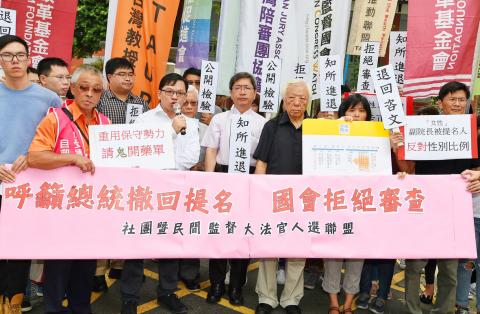Judicial Yuan presidential nominee Hsieh Wen-ting (謝文定) yesterday denied accusations that he was a prosecutor in charge of multiple controversial cases during the White Terror era, saying that his involvement was limited to “assisting with those investigations.”
Hsieh was accused by 18 judicial reform groups led by the Alliance for Civic Oversight of Supreme Court Justice Nominees and the Judicial Reform Foundation of being the lead prosecutor in multiple White Terror era legal cases that some consider to epitomize human rights violations by the then-authoritarian administration.
The cases included the Jhongli Incident, the Kaohsiung Incident and the murders of relatives of democracy activist Lin I-hsiung (林義雄).

Photo: Chu Pei-hsiung, Taipei Times
The Jhongli Incident refers to a mass demonstration in 1977 against ballot-rigging by the government in a county commissioner election, and the Kaohsiung Incident, or the Formosa Magazine Incident, refers to a clash between security forces and democracy activists in 1979.
Lin, an organizer of the Kaohsiung protest and later a Democratic Progressive Party (DPP) chairman, was in 1980 convicted of treason for his role in the clash.
That same year, his mother and twin daughters were stabbed to death in mysterious circumstances. Although the then-government was widely believed to be responsible for the murders, they remain unsolved.
Earlier yesterday, the groups alleged that Hsieh had wilfully concealed his role in those cases in the resume he submitted to the legislature and demanded that President Tsai Ing-wen (蔡英文) rescind the nomination, or for the legislature to refuse to vote for his confirmation if she was unable or unwilling to do so.
Alliance convenor Chiu Hei-yuan (瞿海源) said that the nomination of Hsieh by Tsai was procedurally “the most slap-dash job we have seen since the founding of our organization in 2003,” and that Tsai had “bypassed” the evaluation committee for the nomination.
The scheduled confirmation in an extempore legislative session would make “objective evaluation of the nominee impossible,” Chiu said.
In a statement issued on the same day, Hsieh said that the prosecutor assigned to the Jhongli Incident with the surname Liu (劉) had a schedule conflict and that Hsieh was ordered to replace Liu as the acting prosecutor.
Hsieh said that during the Kaohsiung Incident, he was ordered to assist the assigned prosecutor, surnamed Sun (孫), by interrogating “several” defendants, on account of “the sheer number of accused.”
In the case of the murder of Lin’s daughters and mother, Hsieh said that he was under orders by the then-head prosecutor of the Taipei District Prosecutors’ Office to assist Sun by investigating Bruce Jacobs, a US professor under suspicion at the time, whom he eventually cleared as a suspect.
“I am known for handling all of my cases according to an attorney’s conscience all of my career,” he said.
Presidential Office spokesman Alex Huang (黃重諺) yesterday issued a statement saying that Tsai was aware of Hsieh’s role in those cases, adding that during the previous DPP administration of former president Chen Shui-bian (陳水扁), former minister of justice Chen Ding-nan (陳定南) named Hsieh as a deputy minister and Chen Shui-bian nominated him as the Supreme Prosecutors’ Office secretary-general.
Additional reporting by Chung Li-hua

A preclearance service to facilitate entry for people traveling to select airports in Japan would be available from Thursday next week to Feb. 25 at Taiwan Taoyuan International Airport, Taoyuan International Airport Corp (TIAC) said on Tuesday. The service was first made available to Taiwanese travelers throughout the winter vacation of 2024 and during the Lunar New Year holiday. In addition to flights to the Japanese cities of Hakodate, Asahikawa, Akita, Sendai, Niigata, Okayama, Takamatsu, Kumamoto and Kagoshima, the service would be available to travelers to Kobe and Oita. The service can be accessed by passengers of 15 flight routes operated by

Chinese spouse and influencer Guan Guan’s (關關) residency permit has been revoked for repeatedly posting pro-China videos that threaten national security, the National Immigration Agency confirmed today. Guan Guan has said many controversial statements in her videos posted to Douyin (抖音), including “the red flag will soon be painted all over Taiwan” and “Taiwan is an inseparable part of China,” and expressing hope for expedited reunification. The agency last year received multiple reports alleging that Guan Guan had advocated for armed reunification. After verifying the reports, the agency last month issued a notice requiring her to appear and explain her actions. Guan

GIVE AND TAKE: Blood demand continues to rise each year, while fewer young donors are available due to the nation’s falling birthrate, a doctor said Blood donors can redeem points earned from donations to obtain limited edition Formosan black bear travel mugs, the Kaohsiung Blood Center said yesterday, as it announced a goal of stocking 20,000 units of blood prior to the Lunar New Year. The last month of the lunar year is National Blood Donation Month, when local centers seek to stockpile blood for use during the Lunar New Year holiday. The blood demand in southern Taiwan — including Tainan and Kaohsiung, as well as Chiayi, Pingtung, Penghu and Taitung counties — is about 2,000 units per day, the center said. The donation campaign aims to boost

The Central Weather Administration (CWA) said a magnitude 4.9 earthquake that struck off the coast of eastern Taiwan yesterday was an independent event and part of a stress-adjustment process. The earthquake occurred at 4:47pm, with its epicenter at sea about 45.4km south of Yilan County Hall at a depth of 5.9km, the CWA said. The quake's intensity, which gauges the actual effects of a temblor, was highest in several townships in Yilan and neighboring Hualien County, where it measured 4 on Taiwan's seven-tier intensity scale, the CWA said. Lin Po-yu (林柏佑), a division chief at the CWA's Seismological Center, told a news conference